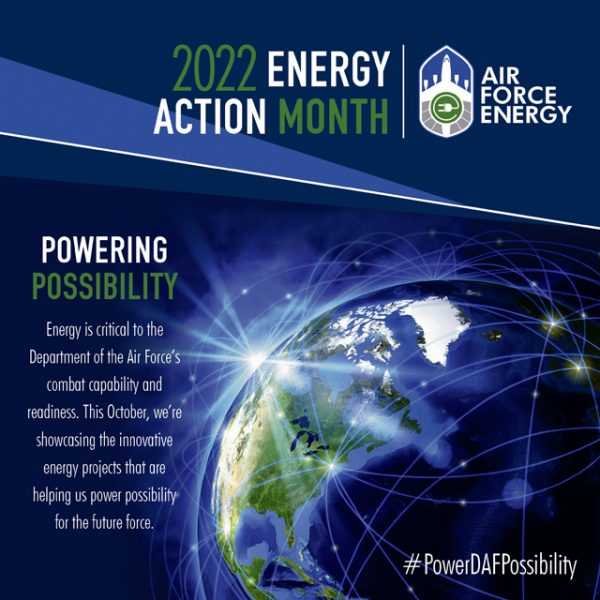 Winter is coming. In case you haven’t noticed cooler temperatures both in the mornings and evenings, changing colors of leaves on trees, or recent availability of pumpkin spice flavored coffees at the KMCC, winter is coming, soon. The good news: there is no zombie apocalypse of white walkers coming to Germany. The bad news: utility costs are rising very rapidly.
Winter is coming. In case you haven’t noticed cooler temperatures both in the mornings and evenings, changing colors of leaves on trees, or recent availability of pumpkin spice flavored coffees at the KMCC, winter is coming, soon. The good news: there is no zombie apocalypse of white walkers coming to Germany. The bad news: utility costs are rising very rapidly.
Every October, the Department of the Air Force pushes information, advice, and other tools to help motivate Airmen and civilians to move toward energy conversation measures. This includes energy saving in your home, office space, and even, ground transportation. We encourage all personnel to be good neighbors to our Host Nation by practicing energy conservation measures. Doing so will combat possible utility bill increases, help comply with Host Nation energy reduction plans, and possibly prevent fuel shortages. Simple, repetitive, daily actions have a big impact long-term, in terms of energy.
What is the definition of energy conservation?
In simple terms, energy conservation is a decision and an action, that you as a person, make to use less energy in your everyday life. First, this can help you save your money. Second, this can help extend fuel resources like heating oil and natural gas. Finally, and most importantly, help preserve our environment. Most energy consumed today is still produced by burning fossil fuel; 40 percent of the fuel used by Germany to produce heat comes from natural gas. Burning these fuels create emissions, like smoke, that enter the environment and create a greenhouse effect and traps heat, which makes Earth temperatures unstable and contribute to climate change.
What can we do to conserve energy?
First and foremost, lower your thermostats in your home, which leads to consuming less energy, albeit with a slightly cooler home. The World Health Organization (WHO) proposed 18 degrees centigrade (C) (64 Fahrenheit) as a safe and well-balanced indoor temperature to protect the health of general populations during cold seasons. Ideally, start with thermostats at 18 C (64 F), and then increase by one degree each day until you find a temperature your family is comfortable with, taking into consideration infants and elderly family members. If you do not have a thermostat, and merely a dial on a radiator, start below the mid-point and adjust accordingly.
The Air Force estimates 30 percent of energy is wasted in commercial buildings, on average. To help reduce energy consumption and waste at your office follow at least one of these practices:
- Turn off lights when not in use or when natural daylight is sufficient.
- During winter season, modify temperature in offices based on business hours.
- Make sure all radiators or A/C vents are free and clear of large office furniture.
- Turn off monitors at the end of workday. Enable power management function on office computers, which automatically puts monitors to sleep when not in use.
- Turn off office equipment when it is not needed at night or on weekends. Activate sleep settings on all printers, copiers, fax machines, scanners, and multifunction devices so that they automatically enter a low-powered sleep mode when inactive.
- Our Airmen living in dormitories or Lodging, and our families living on base in Military Family Housing also play a big role in helping to reduce our installation energy bill. To help reduce energy at your dorm, lodging room, or your home, follow at least one of these practices:
- Turn off power to computers, TVs, exercise equipment, lights, and all electronic devices when not in use to avoid wasting standby power.
- Plug multiple devices into a power strip with a surge protector so you can turn them all off with the flip of one switch, while also protecting them from damage.
- Use water wisely. Turn it off when not in use, such as while brushing teeth and shaving.
- Turn up or down your thermostat by two degrees. Each degree that you lower a thermostat can reduce your heating costs by as much as 3 percent.
- Dress for the season. Wear sweaters, long pants, and or extra blankets when it’s cold.
What should we not do?
One issue that comes with trying to conserve energy by keeping your home slightly cooler than normal, is some people to try innovative, alternative ways to provide heat. Please do not use unapproved devices to provide heat; do not use your oven to heat your house. Please, Please, Please, no open flames. A wood burning stove, with a door and proper connection to a chimney is great; one or two candles are fine for light, but absolutely no fire pits inside.
If you have radiators in your house, do not block with covers and/or furniture. This blocks heat from traveling freely and decreases radiator efficiency. Do not increase thermostat temperature or turn up valve dial setting, and then open window to let the excess heat out for long periods of time. This will increase energy waste, as temperature (heat) travels from hot to cold. In addition, all surfaces will lose heat that was stored inside them.
Bottom Line:
Whatever temp you do settle on, remember, consistency is key! Radical swings in temperature demands, like turning thermostat up and then down, like a roller coaster is worse than simply keeping a lower setting, all the time. Lastly, be safe, be smart, hope for another mild winter and spring will be here before we know it.
Additional information on Energy Action Month can be found at https://www.safie.hq.af.mil/EnergyActionMonth/
or Energy Star.Gov https://www.energystar.gov/buildings/save_energy_commercial_buildings/ways_save/checklists


